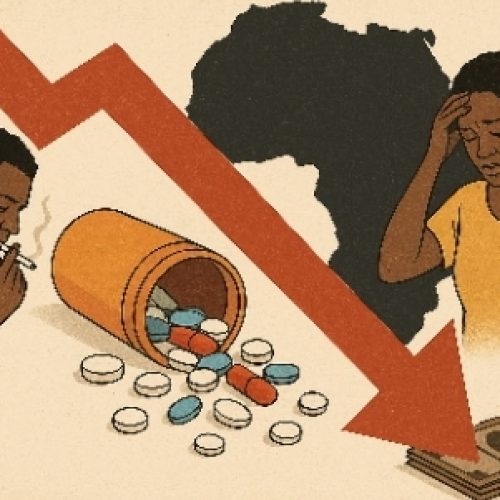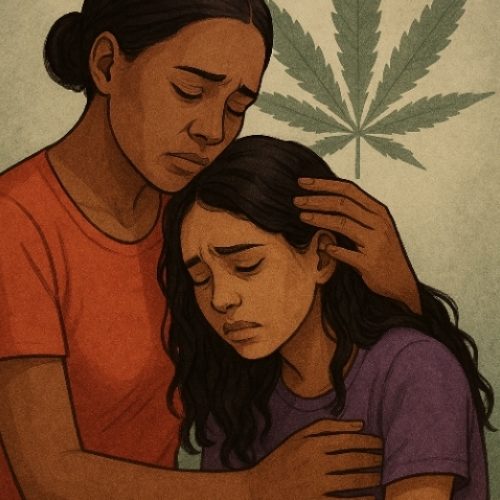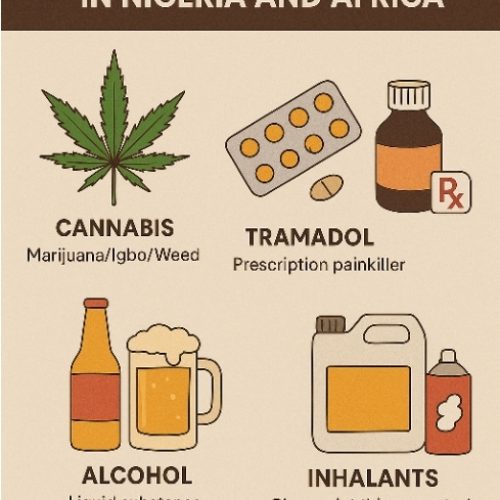“MUM, I’M NOT LIKE THEM ”: A TRUE-LIFE STORY ON KEEPING CHILDREN AWAY FROM DRUGS
“MUM, I’M NOT LIKE THEM ”: A TRUE-LIFE STORY ON KEEPING CHILDREN AWAY FROM DRUGS
I still remember the day I smelt it on my neighbour’s son, Chuka.That faint, choking odour of burnt leaves that clung to his clothes as he walked past my gate, his eyes bloodshot, his laughter empty. He was only 15.
The same boy who once played football on our street with boundless energy, now slouched like a shadow of himself.
I froze, my heart thudding.
What if this were my child?
That night, as I lay awake staring at the ceiling, fear clawed at my chest. I thought about my children bright-eyed, still innocent, but growing in a world where peer pressure, social media, and secrecy could easily lure them.
The truth hit me like cold water: parenting today is not just about feeding and schooling a child. It is a battleground.
It was in that moment that I made a decision.
I would not leave my children’s future to chance. I would fight for them.
This is my story and within it are the seven parenting lessons that helped me shield my children from drugs. Maybe, just maybe, it can help another parent out there breathe easier at night.
Tip 1: Start the Conversation Early, Even When It Feels Awkward
When my daughter, Uju, was 10, she asked me:
“Mummy, what’s weed? My friend’s brother said he smokes it because it makes him feel on top of the world.”
I almost choked on my tea.
The old me would have waved her off: “Don’t worry about such things, you’re too young.” But I had learnt from watching other families fall apart because silence can be deadly.
So I took a deep breath and answered her truthfully, in words she could understand. I told her drugs may make someone feel good for a moment, but they destroy slowly, like sugar eating away at teeth.
I showed her pictures of young people before and after drug use. We talked, and I promised she could ask me anything, anytime.
That night, I saw the relief in her eyes. She knew she didn’t have to go to the internet or her friends for answers she could come to me.
Tip 2: Be the Parent Who Listens Without Judging
My son, Uche, once confessed something to me in a whisper:
“Mummy, my friends were passing a cigarette today during break. I didn’t smoke it, but… they laughed at me.”
His voice trembled. For a second, I wanted to scream: “Don’t you ever go near them again!” But I bit my tongue. If I exploded, he would hide things from me next time.
Instead, I put my arms around him and said, “Thank you for telling me. That took courage.” We talked about peer pressure and why saying no sometimes feels like carrying the heaviest stone. I told him real bravery is choosing what’s right even when it’s unpopular and letting his no be NO
That day, I learnt: children don’t need perfect parents, they need parents who make it safe to share their imperfections.
Tip 3: Know Their Friends, Know Their World
I made it my duty to know the names of my children’s friends, to invite them over, to chat with them, to observe quietly. When Uju’s friend, Blessing, began showing signs of withdrawal, avoiding eye contact, skipping meals, and losing weight, I knew something was wrong.
I didn’t accuse or shame her. I offered her food, love, and eventually, she confessed she was struggling at home. Her father was an alcoholic, and she was often left alone.
That incident taught me: sometimes, the company your child keeps is a mirror reflecting what they are exposed to. By knowing their world, you don’t just protect your child, you may end up saving another.
Tip 4: Model the Life You Want Them to Live
One evening, Uche, looked me straight in the eye and said, “Mummy, why don’t you drink beer like other parents?”
I laughed softly and told him, “Because I want to be in control of myself. What I do teaches you more than what I say.”
I realised then that our children are always watching. If they see us drown our stress in alcohol or pills, they learn that substances are a refuge. But if they see us pray, take walks, or talk through problems, they learn healthier ways of coping.
Tip 5: Keep Them Busy With Purpose, Not Just Activities
During holidays, instead of leaving them to endless TV or unsupervised hangouts, I signed Uju up for a coding class and Uche for football training. Not because I wanted them to be geniuses, but because idle hands, as we say, are the devil’s workshop.
Purposeful engagement builds identity, and a child who knows their worth is less likely to let drugs define them.
Tip 6: Teach Them to Handle Failure and Pain
One of the biggest reasons young people turn to drugs is the inability to deal with disappointment. When Uche’s team lost a championship, he came home crying, shouting, “I’m useless! I don’t want to play again!”
I held him close and told him stories of my own failures, how I once applied for a job three times before getting it, how rejection can sting but also strengthen. I told him real champions are not those who never fail, but those who rise again.
Teaching children resilience is like giving them armour. When life hits, they don’t look for escape in dangerous places.
Tip 7: Build a Home Filled With Love and Boundaries
Some parents think love means letting children do whatever they want. Others think discipline means no softness at all. I learnt it’s a balance.
My children know I love them fiercely but they also know our home has rules. No secret sleepovers. No coming home past a certain hour. Phones are monitored until a certain age. Yes, they groan and roll their eyes, but deep down, they know it’s love.
Because love without boundaries is neglect. And boundaries without love are tyranny. Children need both.
The Night That Changed Everything
Months after that first whiff of smoke from Chuka, I heard his mother wailing one midnight. He had overdosed. By the time they rushed him to the hospital, it was too late.
I wept too not because he was my son, but because he could have been. He was someone’s precious child, now gone.
That night, I gathered my children, hugged them so tight they wriggled. Through my tears, I whispered, “I will fight for you. Every single day. Even when you’re angry at me, even when you don’t understand. I will keep fighting.”
Because this is not just about parenting.
It is about survival.
What Parents Like Me Should Know
No parent is perfect. We stumble, we worry, we sometimes shout when we should listen. But what matters is staying present, intentional, and determined.
If you take nothing else from my story, remember these seven truths:
Talk early, talk often.
Listen without judgment.
Know their friends and world.
Model what you preach.
Give them purposeful engagement.
Teach resilience.
Love fiercely, but with firm boundaries.
Because one day, your child may whisper, “Mummy, I’m not like them. I said no.” And in that moment, you’ll know all the tears, all the tough talks, all the late-night prayers were worth it.
But here’s my honest confession:
I still worry. I still wonder if I’m doing enough. I still ask myself what if the world out there is louder than my voice at home?
Maybe that’s why I’m sharing this story, not as an expert, but as a mother still learning on the job.
Because raising children away from drugs is not just about my home, it is about our community.
So, let me leave you with a question:
If every parent did one thing differently today listened more, loved harder, or set firmer boundaries, how many more Chukas could we save?
These true-life inspired stories are shared by Balm for the Bruised Foundation to spark conversations that save lives. What are your thoughts? What parenting tips have worked for you in keeping children safe from drugs? Let’s talk.
About author
You might also like
THE SILENT BILL: COUNTING THE ECONOMIC COST OF DRUG ADDICTION IN AFRICA
THE SILENT BILL: COUNTING THE ECONOMIC COST OF DRUG ADDICTION IN AFRICA At first glance, Daniel looked like any other young man in his mid-twenties, bright-eyed, charming, and full of
THE FADING LIGHT
THE FADING LIGHT When Adaeze was born, her mother called her “My Sunshine.” She had a laugh that could brighten even the darkest room, a child so curious she could
Shadows We Inhale: The Untold Stories Of Substance Abuse In Nigeria and Africa
Shadows We Inhale: The Untold Stories Of Substance Abuse In Nigeria and Africa It began with a puff. Just one, and he told himself it would never happen again. Chinedu




0 Comments
No Comments Yet!
You can be first to comment this post!